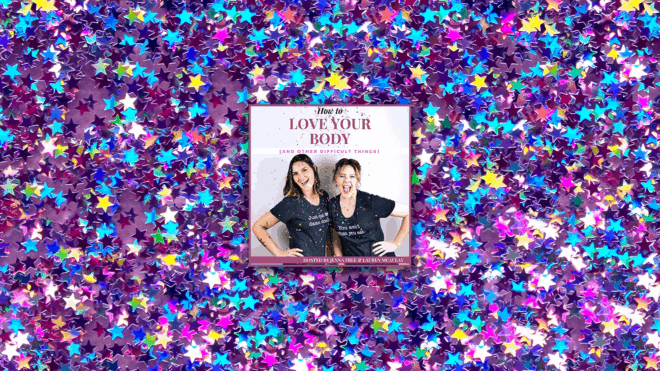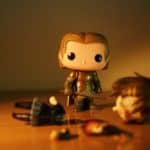“How To Love Your Body” Helped Me With My Eating Disorder

Editor’s note: This piece discusses eating disorders, weight loss and gain, and other body-image and diet related conversations. Reader discretion is advised.
My life changed the day I was diagnosed with anorexia nervosa in November 2018. In July 2019 I was formally discharged from my treatment and deemed “recovered”; however, for me, I will never truly be “recovered” from my eating disorder. Anorexia will always be a part of my life–I have just become strong enough to face it. But there are still moments where I feel completely submerged in the disorder.
When my country went into lockdown during March 2020, I noticed myself struggling with both my eating habits and the perception of my body. Along with anorexia, I also struggle with a disorder known as body dysmorphia (BDD). Body dysmorphia means I struggle to perceive my body and features the way everybody else does and often obsess over my physical appearance to an unhealthy extent. Being stuck indoors with little to do, allowed for my disorder to try and control me again. I found myself constantly looking in mirrors and scrutinizing my appearance. On social media, people were encouraging others to use this time to lose weight–as if they were completely oblivious to the mental toll this pandemic was having on everybody.
My eating disorder (and subsequently BDD) developed for multiple reasons, but growing up in a society that teaches people the worst thing you could possibly be is fat, was certainly a factor. Both online and in-person I would be bombarded with adverts and advice on how to lose weight, and I eventually started yo-yo dieting at the age of 11. The diet industry and blatant fatphobia in society had already affected me before I was even a teenager.
Read more: Seen and Not Heard: On Hearing, On Listening
A few months into lockdown, I started to become exhausted. Six years of dieting, disorders, and self-hatred made me feel completely fed up. Trying to battle my disorder mentally was causing me to feel depressed and I just wished I could unlearn everything society had taught me about eating and human bodies. This is when I came across the How To Love Your Body podcast.

Apple Podcasts | Stitcher | Website
The podcast, hosted by Jenna Free and Lauren McAulay, was just the thing I had been searching for. The two women are both intuitive eating counsellors and the founders of The Body Love Society. When they shared their stories in the first episode, ‘What The Hell Is This All About?” I could instantly relate to what they were saying. At one point, Free talks about when she was getting ready to go on vacation: “I was trying on a bathing suit thinking, ‘Okay, so when I lose five pounds and get a six-pack, then the vacation will be fun.’” It was reassuring to hear someone share their experiences so close to mine. I remember being 12 and looking in the mirror, telling myself that I would be happy once I lost weight. I believed for so long that I couldn’t wear certain items of clothing because I wasn’t skinny enough. But the problem is, in the eyes of society, and, eventually in my case, an eating disorder, it will never be “enough.” Once you reach a target set, i.e. a goal weight, you will be told to lose more. It’s a constant battle.
Despite them being two adult women who live in different countries to my own and have children, I could still completely align myself with them. It’s when I realized that the diet industry and society do not discriminate in who they target. Everyone and anyone can be a victim of diet mentality. This is exactly why the podcast promotes the “undieting” approach.
The undieting and intuitive eating approach is, of course, hard. Especially in a world that constantly tells you that should be getting “into shape.” I remember at the beginning of the pandemic when I’d be scrolling on social media and people would be saying now is the time to lose weight. This was extremely triggering to see. So when I came across How To Love Your Body I felt like I had been equipped with ways to combat diet culture.
We are all born intuitive eaters, when we were babies, we would cry when we wanted to be fed, and then we would eat. But as we grew up in a society where the diet industry is worth billions of dollars, we started to listen to corporations more than ourselves.
Once discovering the How To Love Your Body podcast I felt like I had walked through a different dimension, but I still felt lost. I realised this was the mentality and community I wanted to have and be a part of. Yet I still wasn’t exactly sure how to achieve it. Diet mentality was still at the forefront of my mind and I was worried that by trying to eat intuitively, my disorder would take it to the extreme and I would end up back at square one.
Episode 77, “But I Don’t Want To Gain Weight/Still Want To Lose Weight,” intrigued me; I wanted to hear their advice. Whilst I have no scales in my house and for two years have had no idea what I weigh, I still worried about seeing a physical shift in my appearance. At the beginning of the episode, the hosts discuss the common goal of still wanting to lose weight. They say that “in this work, sometimes it feels like we’re really supposed to not care at all, […] not worry about the weight anymore.” They then go on to say, “But it just isn’t that simple.” When I heard these words, it felt like I could let out a sigh of relief. I would constantly get frustrated at myself for not being able to just deal with it and finally release myself from the shackles of diet culture and an eating disorder.
In the episode, they go on to explain why the pursuit of weight loss and intuitive eating cannot go hand in hand, as well as offering practical advice to help those of us who struggle. They explain that the reason you cannot attempt to lose weight at the same time as trying to eat intuitively is that “when you pursue weight loss, you will second guess your body’s signals.” I realized how long it had been since I had truly listened to my body.
We are all born intuitive eaters, when we were babies, we would cry when we wanted to be fed, and then we would eat. But as we grew up in a society where the diet industry is worth billions of dollars, we started to listen to corporations more than ourselves. Jenna and Lauren point out that nothing is wrong with weight loss if that’s what happens to your body when you eat intuitively, but it’s when you let the pursuit of it control your life that it becomes a harmful problem.
Hosts Free and McAulay offer suggestions on what to commit our energy to rather than the pursuit of weight loss. “You can honor your body and take amazing care of it,” they explain, “without it being about weight all the time […] focus on feeling good in your own body.” Feeling good in my own body was something I never thought I would achieve, but with the help of the How To Love Your Body podcast, and other resources, I started to show gratitude towards my body. Rather than looking in the mirror and tearing my appearance apart–a frequent occurrence that at one point during 2020 led me to list at least one thing I hated about every part of my body–I started to compliment myself. I cannot describe the mentality shift I have experienced because of this. Those who know me understand what I’m talking about, as I now regularly look in mirrors and flood myself in compliments that I truly believe. My biggest wish is for everyone to feel the way I do.
Like everything, however, there are of course slip-ups. I still have bad body image days, and during early Summer last year, when I was particularly struggling, I turned again to the podcast. Specifically, Episode 97, “What to do on a Bad Body Image Day.”
“You absolutely can get through these days,” we are told just two and half minutes into the episode. Which is sometimes all I need to hear. When you’ve been suffocating at the hands of diet culture for most of your life, it feels easier to just give in to a life of exhaustion, self-hatred, and misery, but to be reminded that I am strong enough to get through these days was the push I needed at the time. They explain that they are at the point of their journey where they don’t have bad body image days, but rather “bad body image moments.” For me, just hearing that phrase was a game changer. When I would feel insecure about my body, I would essentially write the day off to wallow and tear myself apart even more. The idea that I could end that cycle and minimize impact was intriguing, to say the least.
So what do Free and McAulay recommend for bad body image moments? The first thing they suggest is to stay away from body checking. For those unfamiliar with the term, “body checking” is where you are constantly looking at your body in mirrors and other reflections, and scrutinizing it. The example they give is “lifting up your shirt looking at your stomach and really fixating on parts of your body.” Again, as someone with BDD, I did this (and occasionally still do) frequently. I would walk past cars and stare at my reflection in the window. They recommend trying to avoid mirrors and recognize today is not the day to study your appearance in a negative light. Working towards looking at your appearance in the mirror without judgement is always great, but it’s okay to take a step back.
Read more: I Want You to Listen to Lolita Podcast
Next, they suggest a “shift to neutral body comments.” If you find yourself saying negative things about your body take a step back and recognize that you do not have to say those words to yourself. Trust me, self-hate will not change your body, it will just make you feel worse. Of course, like everything Jenna and Lauren suggests, it’s not easy. It is something you have to work towards. But if you’re feeling skeptical, I have been changing the way I talk about myself and I have never been happier. Of course, being completely positive about your body is hard, and practically impossible to do 100% of the time. This is why neutral self-talk is suggested first. So instead of saying, “I hate my body,” shift to saying, “I have a body.” It’s a neutral and factual statement that doesn’t bring you down. Recognize and show gratitude towards your body and what your body is capable of doing. On the rare days when I struggle to look in the mirror and say something positive, I instead say something neutral. Something that seems so miniscule had a seismic shift on my mindset and mental health.
When you’ve been suffocating at the hands of diet culture for most of your life, it feels easier to just give in to a life of exhaustion, self-hatred, and misery, but to be reminded that I am strong enough to get through these days was the push I needed at the time.
They also suggest wearing comfortable clothes that fit well and not forcing yourself to wear clothes that don’t fit you how you’d like and staying off social media to lessen comparison. I cannot recommend taking a break from social media enough. When I was diagnosed with anorexia I deleted every social media app, and I seriously believe that if it weren’t for that, recovery would have been even harder. If you find yourself comparing your life or body to others online, maybe take a step back and look after your mental health. Instead of endlessly scrolling, I might call a friend, read a book, or watch TV to take my mind off things. The final suggestion they offer is to ground yourself in nature. It can help keep you present and bring you back to your body, rather than being in your head and critiquing the body that allows you to exist.
When I stumbled across the podcast I was unaware of how much it would help me improve myself and my mental health. Whilst not everybody has an eating disorder or BDD, so many of us struggle with insecurities and diet culture. I urge you to listen to the podcast, and to put yourself first. If you had asked eleven year old me, or even me last year, if she could look in the mirror and feel confident, she would have laughed–she felt okay at best. Now I do love my body, not all day everyday, but most days. And for me that felt like something unachievable, until it became my reality.













Comments
Comments are closed.